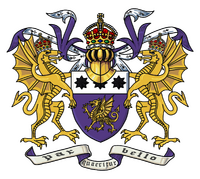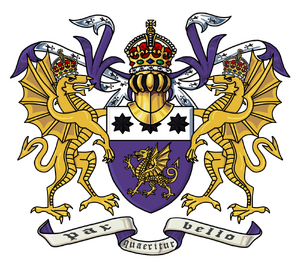King of Reinar
|
| King of Reinar | |
| Royal Coat of Arms | |
| Details | |
| Style | His Majesty |
|---|---|
| First monarch | Sigismund I |
| Current monarch | Henry II |
| Heir presumptive | Prince Edmund of Reinar |
| Formation | 1191 |
| Residence | Kronstadt |
The King of Reinar is the ruler of the Kingdom of Reinar. The hereditary royal title and office was proclaimed in 1191 by Sigismund I, King of Reinar, a member of the House of Altorenne, and has been continually held by him and his heirs till the present day.
Succession
The Kingdom of Reinar is inherited by the successors of King Sigismund I through agnatic primogeniture. It is thus the right of the firstborn son and heir of the previous King to ascend the throne, in preference to younger sons, daughters and elder sons of illegitimate nature. The son of an elder brother who has since been deceased would still inherit the land of his grandfather before that of his Uncles or cousins. In the absence of sons or brothers of the monarch, the succession may pass down the line of the monarch's uncles and his progeny. With either the death or abdication of an incumbent monarch, his heir, the Crown Prince of Reinar and the first in line of succession, is then legally considered to be the sovereign until his own passing or even their own abdication if it comes to it. A year after the funeral or abdication of the previous monarch, the coronation of the current sovereign would follow, legitimately securing him as the King of Reinar.
The eldest legitimate son and heir of His Majesty, the King is referred to as the Crown Prince. The Crown Prince cannot be displaced in the line of succession by either births or deaths. With the death of the Crown Prince, if his father the King is still alive, the title and all subsequent titles associated with the heir apparent to the throne would pass to his firstborn legitimate son. In the case of elder illegitimate children who have thus been legitimized by the monarch, their legitimization does grant them a place in the line of succession although due to them previously being considered bastards ranks them after all trueborn children of the monarch.
In the case of the successor to the throne ascending to his rightful succession before he is of age, a regency council shall be formed with the head of the council, usually one of the young King’s paternal uncle’s, being declared Lord Protector of the Realm until the boy king comes of age on his 16th birthday.
House of Altorenne (1191-present)
Main Article: House of Altorenne
| Name | Portrait | Arms | Birth | Marriages | Death | Claim |
|---|---|---|---|---|---|---|
| Sigismund I Sigismund the Great 1191 - 1199 (8 years) |
File:.png | 
|
1168
Unknown parentage |
Unknown Wife 2 children |
1199 Aged 31 |
Founder of the Kingdom of Reinar |
| Henry I 1199 - 1248 (49 years) |
File:.png | 1187
Son of Sigismund I |
Unknown Wife 1 child |
1248 Aged 61 |
Son of Sigismund I
Primogeniture | |
| Philip I 1248 - 1262 (13 years) |
File:.png | 1214
Son of Henry I |
Isabella, Queen Consort of Reinar 4 children |
1262 Aged 34 |
Son of Henry I
Primogeniture | |
| Henry II 1262 - Present |
File:.png | 1232 Kronstadt Son of Philip I and Isabella, Queen Consort of Reinar |
Alexandrine van Hesper no children |
Alive | Son of Philip I
Primogeniture |
Disputed claimant
Upon Philip I's untimely death he was succeeded by his eldest son, Henry II. Hereward declared himself the King of Reinar following his father's death, believing that his elder brother was incompetent in ruling the Kingdom, with support from members of the northern Reinarian nobility. This led to the outbreak of the Reinarian Civil War.
| Name | Portrait | Arms | Birth | Marriages | Death | Claim |
|---|---|---|---|---|---|---|
| Hereward 1262 - Present |
File:.png | 
|
PUT DATE HERE Kronstadt Son of Philip I and Isabella, Queen Consort of Reinar |
Unmarried | Alive | Son of Philip I |

